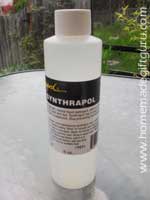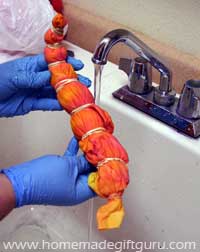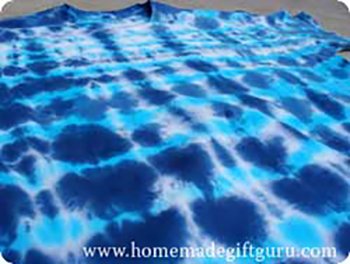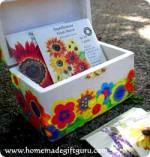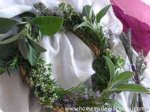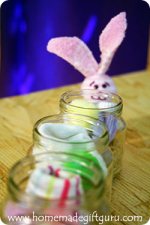Tie Dye Techniques Using Marbles
Marbles Make Fun and Unique Tie Dye Patterns... Great for Creating Unique Homemade Gifts!
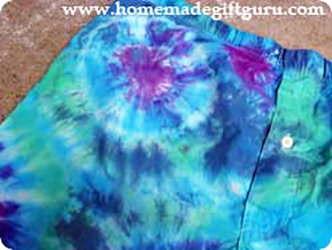
If you love learning new tie dye techniques, you'll definitely want to give marbles a try! They make an awesome tie dye pattern, kind of like fireworks.
Just look at the crazy tie dye pattern to the right...
I've made tie dye t-shirts and tank tops, using various tie dye techniques, such as the traditional 60's style spiral and these easy pleats (my husband's favorite)... but I felt like this fun tie dye pattern would look really cool on a unique piece of clothing.
So... my friend and I chose to create a pair of tie dyed men's boxer shorts for a funny homemade gift (but you can tie dye just about anything with marbles).
Now that they're tie dyed, they're going to make a fun and funny homemade birthday for a good friend of ours. He's not a teen (check out teen gifts here) but he is certainly young at heart!
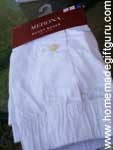
The white boxer shorts came from Target, cost around $5 and have a button on the fly! I had to search a little because I didn't want any of the boxer shorts with elastic showing since elastic won't dye.
Perhaps you are thinking about making a funny and/or trendy pair of tie dye shorts, like these, for your boyfriend... girlfriend... husband or wife... or a good friend with a sense of humor...
Or you might use this marble tie dye technique to tie dye something else, such as:
- t-shirts
- tank tops
- socks
- bandanas
- baby onesies
- blanket cover
- pillow case
- ...whatever you can think of!
Whatever you choose to dye, this tie dye technique is super fun and relatively predictable (in a whimsical kind of way).
You can use marbles of various sizes. You'll need a few. I squeezed as many as I could into this project and used lots of color.
If you're new to tie dye, you may like to check out these tie dye instructions plus tips. You can also learn more about the cold water dyes and tie dye supplies I use for my tie dye projects.
Let's get started!
Marble Tie Dye Technique...
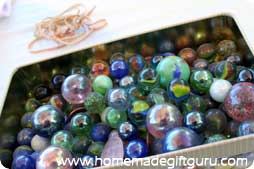
To complete your own cold water tie dye project you'll need the following tie dye supplies (learn more about each supply here).
- MARBLES
- something white to tie dye (I chose boxer shorts)
- cold water dye
- soda ash
- synthrapol (recommended)
- squeeze bottles to mix and apply die with (cups can be used)
- latex or rubber gloves
- white kitchen trash bags
- rubber bands
Step 1. Garment Preparation
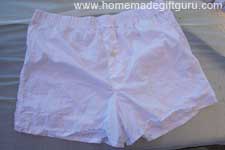
Gather Garments. Choose white clothes or light colored clothing, 100% cotton, linen and rayon are best.
Pre-Wash Fabrics. Always pre-wash your fabric according to fabric directions. Do not use fabric softeners or dryer sheets.
Soak in Fixer.
Soak your clothes for 30 minutes in soda ash water (wearing gloves,
stir in 1 cup soda ash per 1 gallon of water). Soda ash is a dye fixer
that I highly recommend. Using soda ash water will help your dye to bind
well with the fabric for high quality results.
...While your fabrics soak, the next step in the tie dye instructions is to prepare your work space.
Step 2. Prepare Work Space
Protect Work Surface. Lay out plastic trash bags or sheeting (I like to cut kitchen trash bags open, lay them flat and tape down the edges).
Step 3. Bind Fabric (Marble Binding Technique)
Put Gloves on and Squeeze Water From Fabric. Once fabric has been soaked in soda ash, put on gloves and squeeze out excess water from fabric.
Keep fabrics moist. Don't let them dry out before dying them. If you need to, put them in plastic bags for a short time between soaking them and dying them to keep them moist.
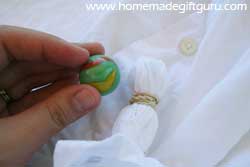
Wrap some marbles. For this tie dye technique, choose various places to wrap and bind a marble snugly in your fabric using rubber bands.
Leave it at that for a rather simple circle or for a more vibrant pattern (like shown above), wrap another rubber band, binding just fabric this time, a little ways below the marble.
I used the giant sized marbles here for a rather dramatic effect.
Continue to bind marbles in your fabric until you feel satisfied. The more marbles, the wilder your results.
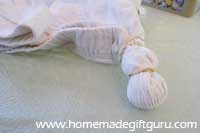
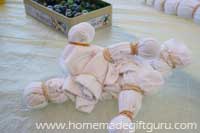
Everywhere you choose to bind a marble will result in a circle radiating out and the bulge under that will be what surrounds your circle.
Here's a simple example of what you'd get without the second bunching below each bound marble... of course, this is using only one color as well.
Either way, a variety of colors will create a more intense effect.
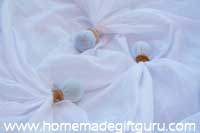 |
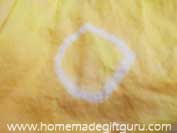 |
Step 4. Prepare Dye
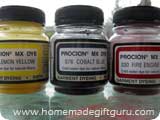
Prepare Dye. Follow instructions on your dye for preparation.
Procion MX dye requires 2 teaspoons of powdered dye to be added to 8 oz of water. For lighter colors you can add more water if desired.
You can apply dye using a squeeze bottle to squeeze it where desired or by pouring it, from a cup, onto desired area.
Both methods work, but squeeze bottles provide more control, plus they are easier to mix (simply shake well).
Tip:
It's a good idea to mix your dye in a place away from your fabrics
and work area to avoid specks of powder from blowing over onto your
projects or your work space.
Safety Precaution: To avoid
skin and eye irritation, it is recommended that you use rubber gloves
during the dying process and do not ever breath powdered dye dust (use
dust mask when adding powdered dye to water if possible). Always work
with dyes and other chemicals in a well ventilated area.
Step 5. Dye Fabric
Squeeze or pour dye as desired. Add color however you choose. If you're unsure of your color palette or needs some tips, there are several tie dye tips on the tie dye instructions page. Be sure to get inside any folds if necessary (a squeeze bottle is helpful for this, shown below).
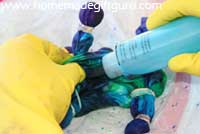
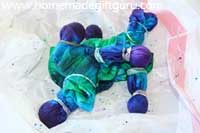
Tip: Use a kitchen trash bag for each piece of fabric, to both contain the mess as you dye and then to wrap your project in afterward.
Step 6. Cover Fabric and Allow Dye to Set
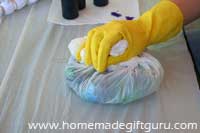
Cover Project. You always want to keep fabrics damp by covering them in plastic. Some people use gallon sized zip lock bags or simply plastic wrap. In this case, you can enclose the fabric right in the plastic kitchen bag, pushing out any air and twisting the bag up securely.
Tip... If you're dying several things, you may want to put your individually bagged projects together in an additional plastic kitchen trash bag (to be safe in case of a leak and to keep them all together).
Let Set. Allow fabrics to sit undisturbed for 24 hours. 24 to 48 hours actually! This fabric "baking" time, as I like to think of it... (along with the soda ash soak and your high quality Procion dyes), will give you well set, vibrant colors (rather than the faded colors that some tie dye kits and dyes result in).
Step 7. Rinse in Warm Water
Rinse fabric in warm water to remove excess dye. Remove rubber bands and marbles one by one, careful not to let the marbles go down the drain. Unravel as you rinse. Continue rinsing until water runs nearly clear.
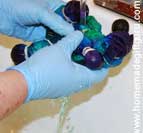

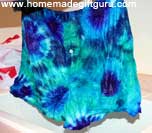
You may notice that some fabrics as well as some colors take longer to rinse than others. It's just differences in dyes and fibers.
8. Wash and Dry Fabric
Wash Fabric. The last step in these tie dye instructions will be to machine wash (or hand wash if necessary) fabric in hottest water suitable for fabric using Synthrapol.
Synthrapol is an industrial strength neutral detergent
that suspends the dye particles so they don't bleed back onto your
fabrics. This is how you keep all your colors where you want them (white
stays white and even bright colors keep to themselves).
Another benefit of Synthrapol
is that it allows you to wash different colored fabrics together
without any dye transferring between fabrics (see the various tie dye
projects being washed together above).
Important Tip: Be aware that wet tie dyed fabrics resting against each other or other fabrics for a long time still have a chance of transferring color. Take them right out of the wash when done and dry immediately.
Dry Fabrics. Machine or line dry as desired.

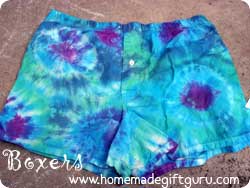
Done!
So that's it!... the marble tie dye technique... keep in mind,
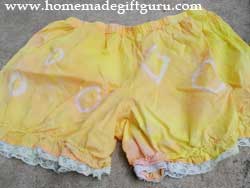
- Fabrics. You can use this tie dye technique or variations of it with any fabric that can be tie dyed.
- Marbles. You can use various sized marbles for different effects.
- Colors. You can use one single color, a couple or several during the tie dying process for very different results.
- Techniques. And you can make simple little circles like those on the yellow bloomers or wild and crazy blasts of color as seen above.
You may also like to learn the classic 60's style spiral tie dye technique or this easy and beautiful circle tie dye technique that radiates outward like a sun and is perfect for beginners.
